Benner's Theory: Transitioning from Novice to Expert in Nursing
VerifiedAdded on 2022/12/30
|8
|2160
|50
AI Summary
This essay report discusses Benner's theory of nursing, which categorizes nurses into five levels of competence: novice, advanced beginner, competent, proficient, and expert. It explores the stages of clinical competence and the functions of novice versus advanced practice nurses. The report also highlights the significance of this theory in the healthcare department for analyzing skills and knowledge in patient care.
Contribute Materials
Your contribution can guide someone’s learning journey. Share your
documents today.
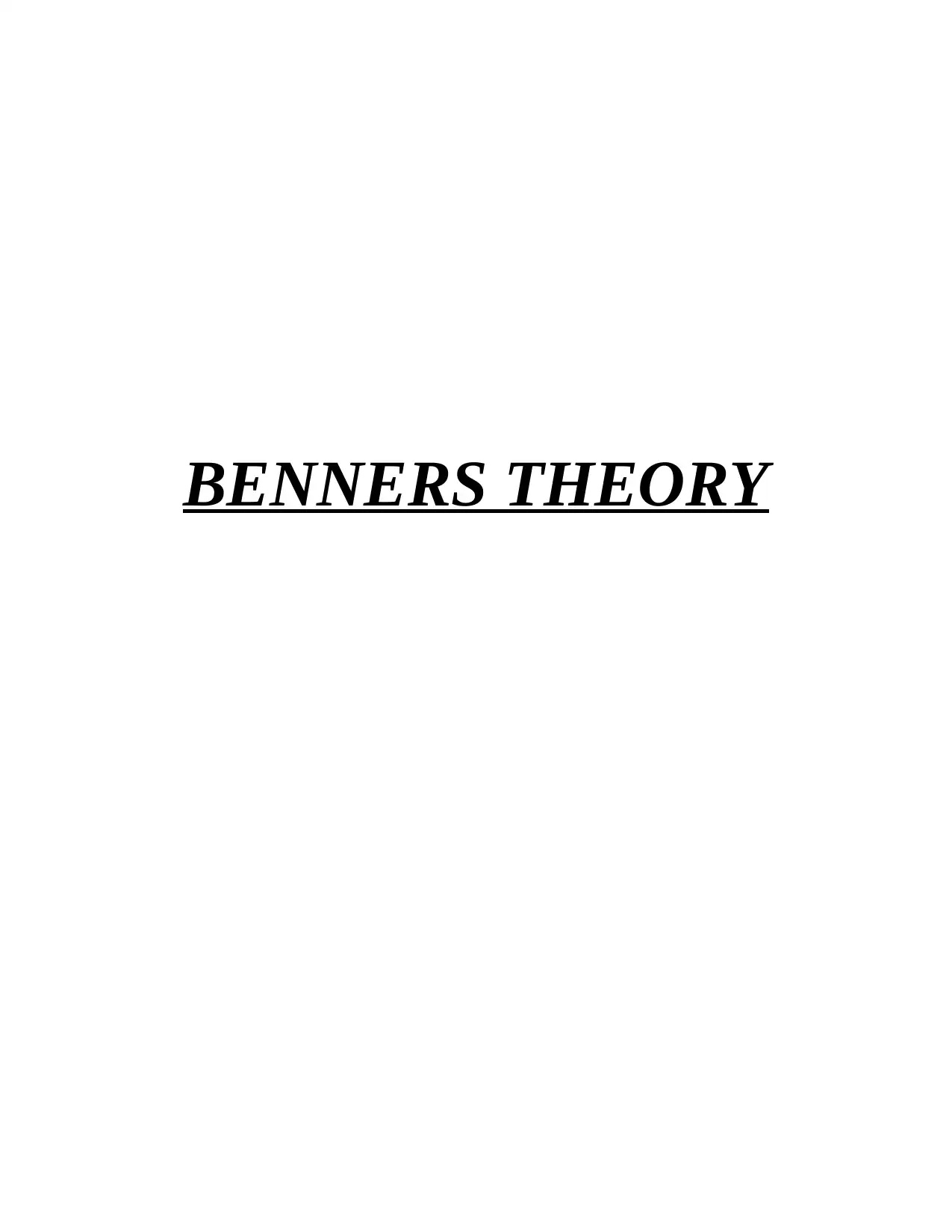
BENNERS THEORY
Secure Best Marks with AI Grader
Need help grading? Try our AI Grader for instant feedback on your assignments.
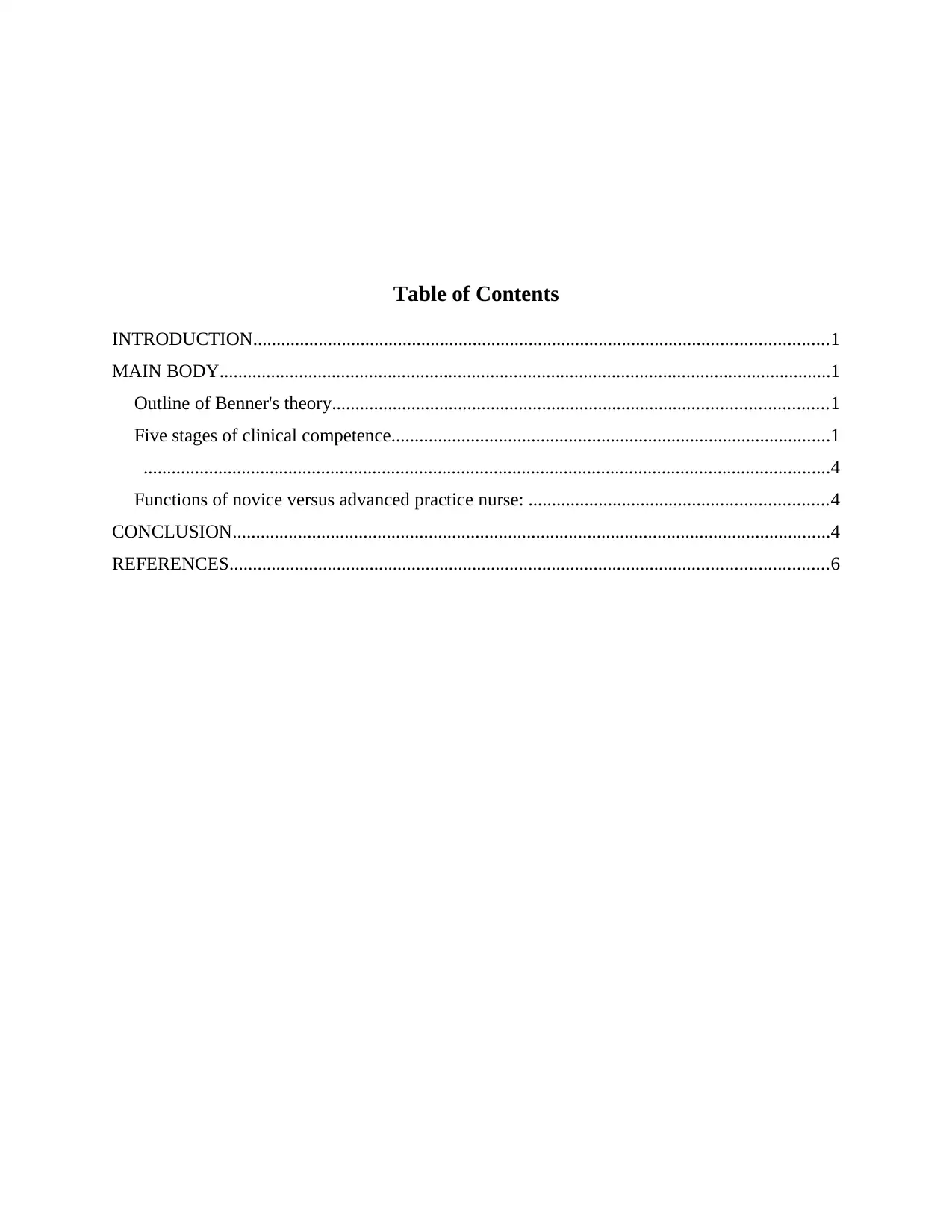
Table of Contents
INTRODUCTION...........................................................................................................................1
MAIN BODY...................................................................................................................................1
Outline of Benner's theory..........................................................................................................1
Five stages of clinical competence..............................................................................................1
...................................................................................................................................................4
Functions of novice versus advanced practice nurse: ................................................................4
CONCLUSION................................................................................................................................4
REFERENCES................................................................................................................................6
INTRODUCTION...........................................................................................................................1
MAIN BODY...................................................................................................................................1
Outline of Benner's theory..........................................................................................................1
Five stages of clinical competence..............................................................................................1
...................................................................................................................................................4
Functions of novice versus advanced practice nurse: ................................................................4
CONCLUSION................................................................................................................................4
REFERENCES................................................................................................................................6
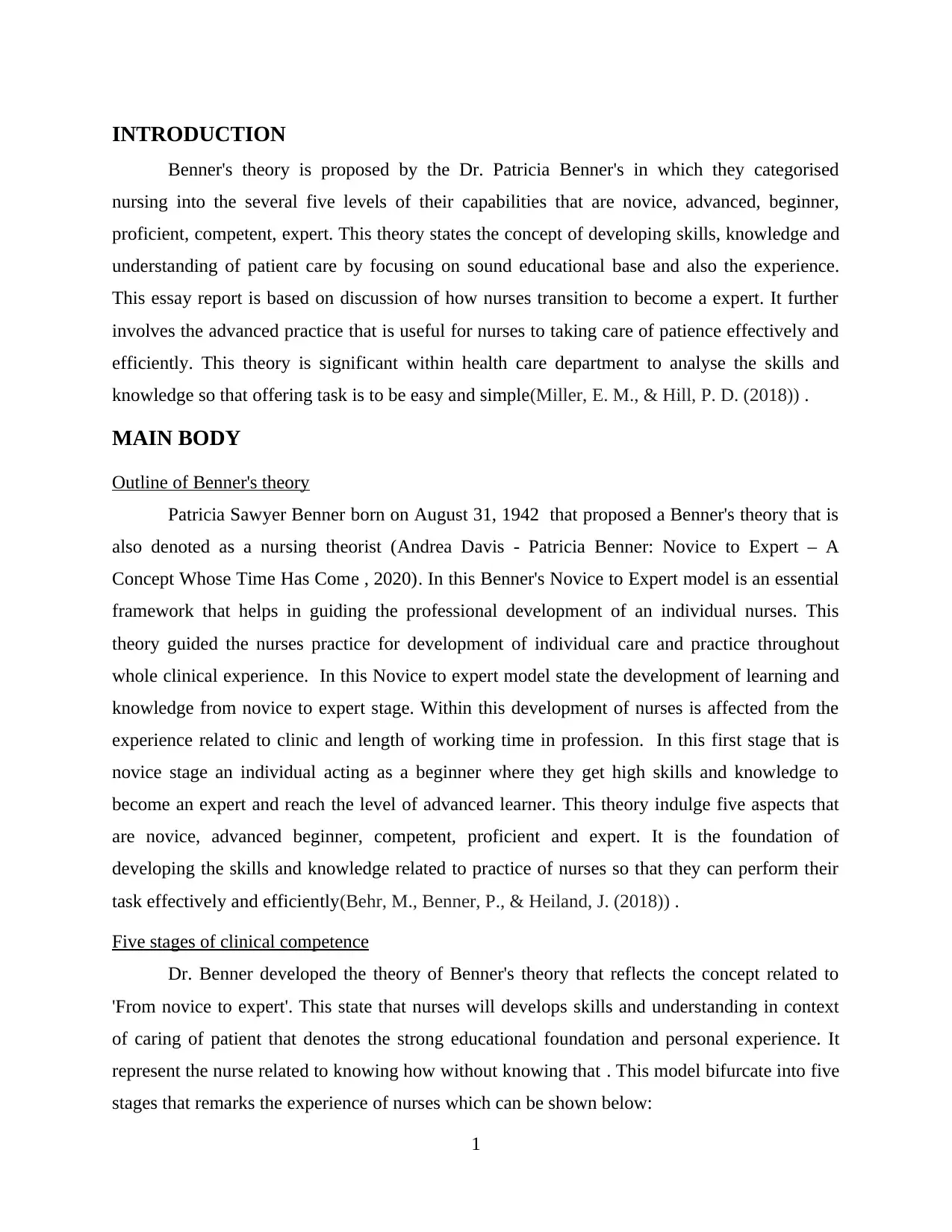
INTRODUCTION
Benner's theory is proposed by the Dr. Patricia Benner's in which they categorised
nursing into the several five levels of their capabilities that are novice, advanced, beginner,
proficient, competent, expert. This theory states the concept of developing skills, knowledge and
understanding of patient care by focusing on sound educational base and also the experience.
This essay report is based on discussion of how nurses transition to become a expert. It further
involves the advanced practice that is useful for nurses to taking care of patience effectively and
efficiently. This theory is significant within health care department to analyse the skills and
knowledge so that offering task is to be easy and simple(Miller, E. M., & Hill, P. D. (2018)) .
MAIN BODY
Outline of Benner's theory
Patricia Sawyer Benner born on August 31, 1942 that proposed a Benner's theory that is
also denoted as a nursing theorist (Andrea Davis - Patricia Benner: Novice to Expert – A
Concept Whose Time Has Come , 2020). In this Benner's Novice to Expert model is an essential
framework that helps in guiding the professional development of an individual nurses. This
theory guided the nurses practice for development of individual care and practice throughout
whole clinical experience. In this Novice to expert model state the development of learning and
knowledge from novice to expert stage. Within this development of nurses is affected from the
experience related to clinic and length of working time in profession. In this first stage that is
novice stage an individual acting as a beginner where they get high skills and knowledge to
become an expert and reach the level of advanced learner. This theory indulge five aspects that
are novice, advanced beginner, competent, proficient and expert. It is the foundation of
developing the skills and knowledge related to practice of nurses so that they can perform their
task effectively and efficiently(Behr, M., Benner, P., & Heiland, J. (2018)) .
Five stages of clinical competence
Dr. Benner developed the theory of Benner's theory that reflects the concept related to
'From novice to expert'. This state that nurses will develops skills and understanding in context
of caring of patient that denotes the strong educational foundation and personal experience. It
represent the nurse related to knowing how without knowing that . This model bifurcate into five
stages that remarks the experience of nurses which can be shown below:
1
Benner's theory is proposed by the Dr. Patricia Benner's in which they categorised
nursing into the several five levels of their capabilities that are novice, advanced, beginner,
proficient, competent, expert. This theory states the concept of developing skills, knowledge and
understanding of patient care by focusing on sound educational base and also the experience.
This essay report is based on discussion of how nurses transition to become a expert. It further
involves the advanced practice that is useful for nurses to taking care of patience effectively and
efficiently. This theory is significant within health care department to analyse the skills and
knowledge so that offering task is to be easy and simple(Miller, E. M., & Hill, P. D. (2018)) .
MAIN BODY
Outline of Benner's theory
Patricia Sawyer Benner born on August 31, 1942 that proposed a Benner's theory that is
also denoted as a nursing theorist (Andrea Davis - Patricia Benner: Novice to Expert – A
Concept Whose Time Has Come , 2020). In this Benner's Novice to Expert model is an essential
framework that helps in guiding the professional development of an individual nurses. This
theory guided the nurses practice for development of individual care and practice throughout
whole clinical experience. In this Novice to expert model state the development of learning and
knowledge from novice to expert stage. Within this development of nurses is affected from the
experience related to clinic and length of working time in profession. In this first stage that is
novice stage an individual acting as a beginner where they get high skills and knowledge to
become an expert and reach the level of advanced learner. This theory indulge five aspects that
are novice, advanced beginner, competent, proficient and expert. It is the foundation of
developing the skills and knowledge related to practice of nurses so that they can perform their
task effectively and efficiently(Behr, M., Benner, P., & Heiland, J. (2018)) .
Five stages of clinical competence
Dr. Benner developed the theory of Benner's theory that reflects the concept related to
'From novice to expert'. This state that nurses will develops skills and understanding in context
of caring of patient that denotes the strong educational foundation and personal experience. It
represent the nurse related to knowing how without knowing that . This model bifurcate into five
stages that remarks the experience of nurses which can be shown below:
1
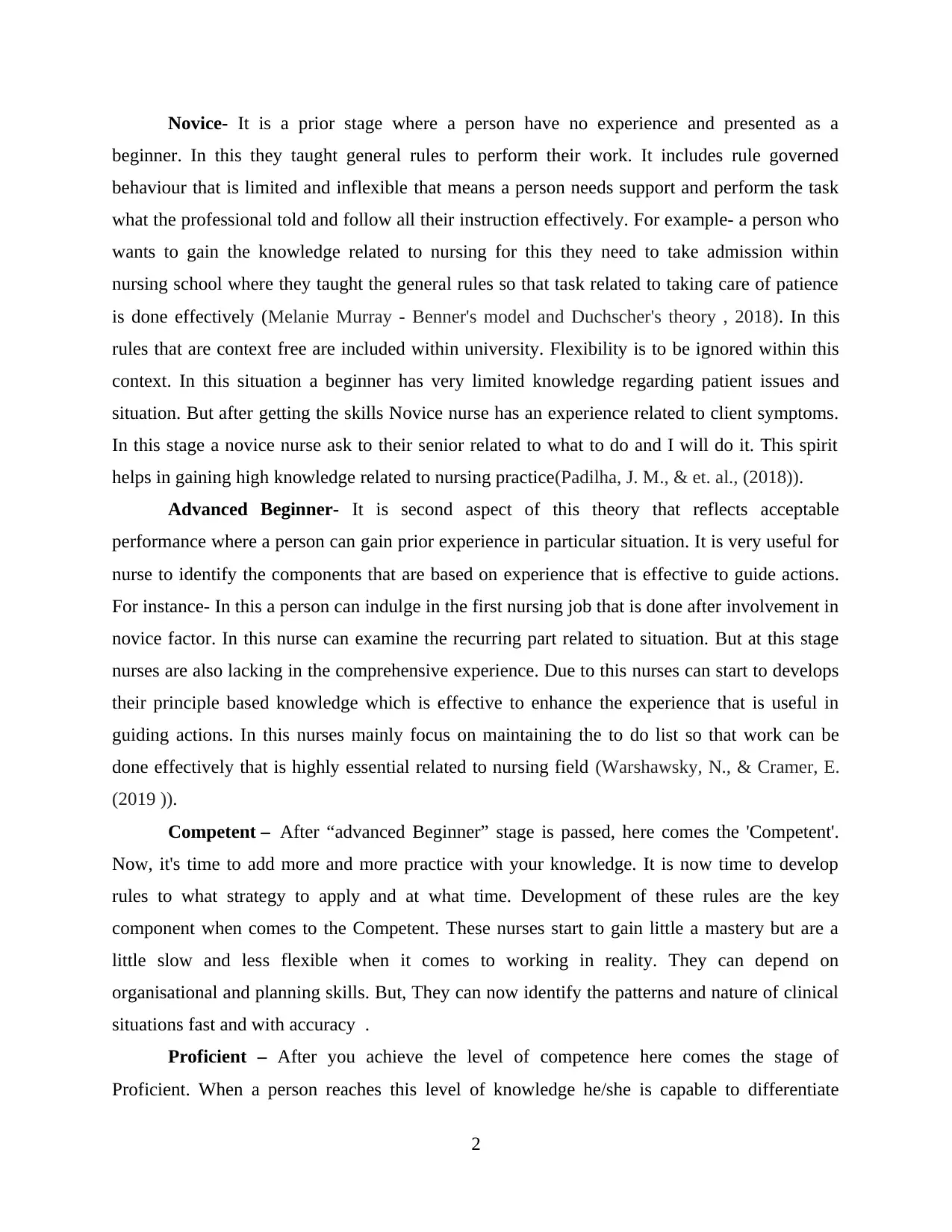
Novice- It is a prior stage where a person have no experience and presented as a
beginner. In this they taught general rules to perform their work. It includes rule governed
behaviour that is limited and inflexible that means a person needs support and perform the task
what the professional told and follow all their instruction effectively. For example- a person who
wants to gain the knowledge related to nursing for this they need to take admission within
nursing school where they taught the general rules so that task related to taking care of patience
is done effectively (Melanie Murray - Benner's model and Duchscher's theory , 2018). In this
rules that are context free are included within university. Flexibility is to be ignored within this
context. In this situation a beginner has very limited knowledge regarding patient issues and
situation. But after getting the skills Novice nurse has an experience related to client symptoms.
In this stage a novice nurse ask to their senior related to what to do and I will do it. This spirit
helps in gaining high knowledge related to nursing practice(Padilha, J. M., & et. al., (2018)).
Advanced Beginner- It is second aspect of this theory that reflects acceptable
performance where a person can gain prior experience in particular situation. It is very useful for
nurse to identify the components that are based on experience that is effective to guide actions.
For instance- In this a person can indulge in the first nursing job that is done after involvement in
novice factor. In this nurse can examine the recurring part related to situation. But at this stage
nurses are also lacking in the comprehensive experience. Due to this nurses can start to develops
their principle based knowledge which is effective to enhance the experience that is useful in
guiding actions. In this nurses mainly focus on maintaining the to do list so that work can be
done effectively that is highly essential related to nursing field (Warshawsky, N., & Cramer, E.
(2019 )).
Competent – After “advanced Beginner” stage is passed, here comes the 'Competent'.
Now, it's time to add more and more practice with your knowledge. It is now time to develop
rules to what strategy to apply and at what time. Development of these rules are the key
component when comes to the Competent. These nurses start to gain little a mastery but are a
little slow and less flexible when it comes to working in reality. They can depend on
organisational and planning skills. But, They can now identify the patterns and nature of clinical
situations fast and with accuracy .
Proficient – After you achieve the level of competence here comes the stage of
Proficient. When a person reaches this level of knowledge he/she is capable to differentiate
2
beginner. In this they taught general rules to perform their work. It includes rule governed
behaviour that is limited and inflexible that means a person needs support and perform the task
what the professional told and follow all their instruction effectively. For example- a person who
wants to gain the knowledge related to nursing for this they need to take admission within
nursing school where they taught the general rules so that task related to taking care of patience
is done effectively (Melanie Murray - Benner's model and Duchscher's theory , 2018). In this
rules that are context free are included within university. Flexibility is to be ignored within this
context. In this situation a beginner has very limited knowledge regarding patient issues and
situation. But after getting the skills Novice nurse has an experience related to client symptoms.
In this stage a novice nurse ask to their senior related to what to do and I will do it. This spirit
helps in gaining high knowledge related to nursing practice(Padilha, J. M., & et. al., (2018)).
Advanced Beginner- It is second aspect of this theory that reflects acceptable
performance where a person can gain prior experience in particular situation. It is very useful for
nurse to identify the components that are based on experience that is effective to guide actions.
For instance- In this a person can indulge in the first nursing job that is done after involvement in
novice factor. In this nurse can examine the recurring part related to situation. But at this stage
nurses are also lacking in the comprehensive experience. Due to this nurses can start to develops
their principle based knowledge which is effective to enhance the experience that is useful in
guiding actions. In this nurses mainly focus on maintaining the to do list so that work can be
done effectively that is highly essential related to nursing field (Warshawsky, N., & Cramer, E.
(2019 )).
Competent – After “advanced Beginner” stage is passed, here comes the 'Competent'.
Now, it's time to add more and more practice with your knowledge. It is now time to develop
rules to what strategy to apply and at what time. Development of these rules are the key
component when comes to the Competent. These nurses start to gain little a mastery but are a
little slow and less flexible when it comes to working in reality. They can depend on
organisational and planning skills. But, They can now identify the patterns and nature of clinical
situations fast and with accuracy .
Proficient – After you achieve the level of competence here comes the stage of
Proficient. When a person reaches this level of knowledge he/she is capable to differentiate
2
Secure Best Marks with AI Grader
Need help grading? Try our AI Grader for instant feedback on your assignments.
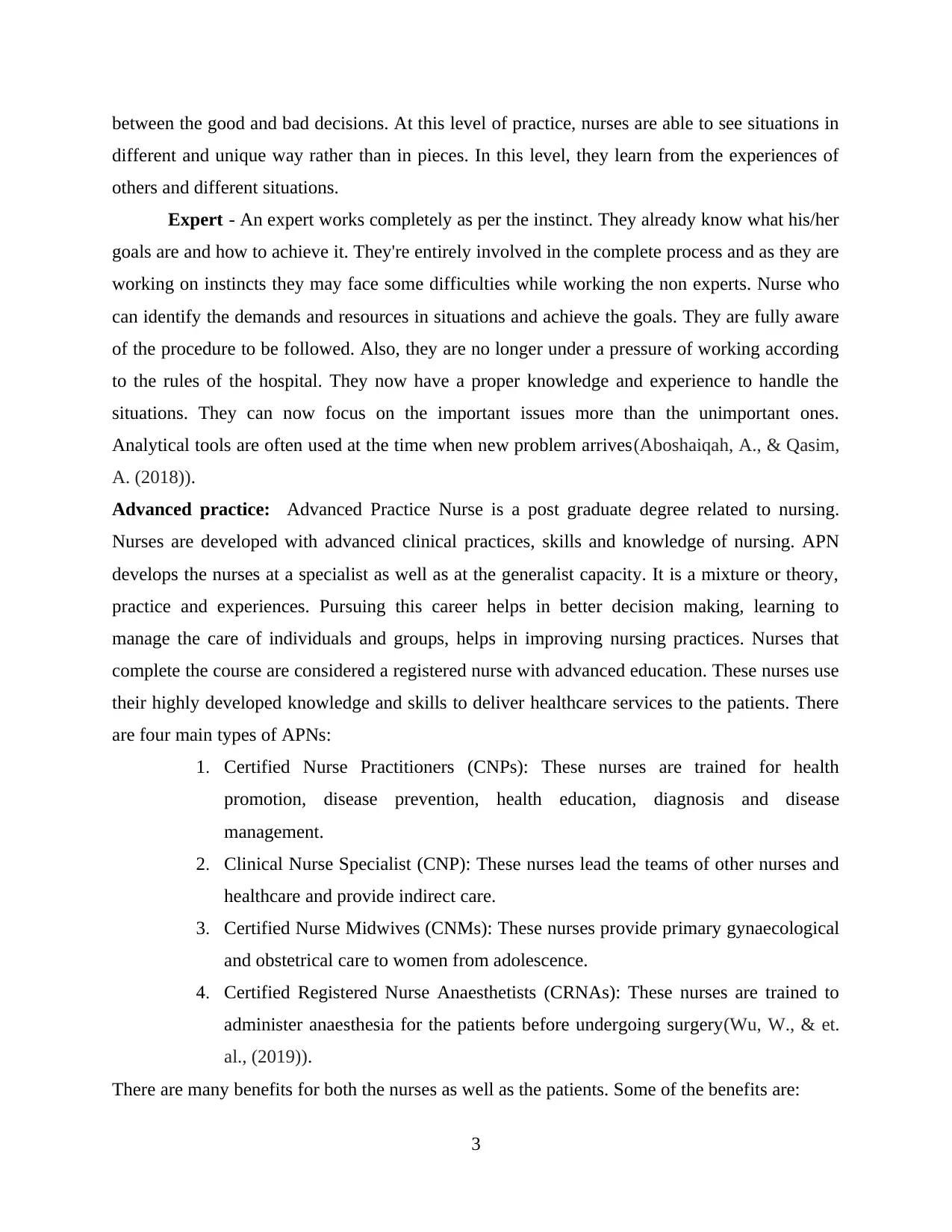
between the good and bad decisions. At this level of practice, nurses are able to see situations in
different and unique way rather than in pieces. In this level, they learn from the experiences of
others and different situations.
Expert - An expert works completely as per the instinct. They already know what his/her
goals are and how to achieve it. They're entirely involved in the complete process and as they are
working on instincts they may face some difficulties while working the non experts. Nurse who
can identify the demands and resources in situations and achieve the goals. They are fully aware
of the procedure to be followed. Also, they are no longer under a pressure of working according
to the rules of the hospital. They now have a proper knowledge and experience to handle the
situations. They can now focus on the important issues more than the unimportant ones.
Analytical tools are often used at the time when new problem arrives(Aboshaiqah, A., & Qasim,
A. (2018)).
Advanced practice: Advanced Practice Nurse is a post graduate degree related to nursing.
Nurses are developed with advanced clinical practices, skills and knowledge of nursing. APN
develops the nurses at a specialist as well as at the generalist capacity. It is a mixture or theory,
practice and experiences. Pursuing this career helps in better decision making, learning to
manage the care of individuals and groups, helps in improving nursing practices. Nurses that
complete the course are considered a registered nurse with advanced education. These nurses use
their highly developed knowledge and skills to deliver healthcare services to the patients. There
are four main types of APNs:
1. Certified Nurse Practitioners (CNPs): These nurses are trained for health
promotion, disease prevention, health education, diagnosis and disease
management.
2. Clinical Nurse Specialist (CNP): These nurses lead the teams of other nurses and
healthcare and provide indirect care.
3. Certified Nurse Midwives (CNMs): These nurses provide primary gynaecological
and obstetrical care to women from adolescence.
4. Certified Registered Nurse Anaesthetists (CRNAs): These nurses are trained to
administer anaesthesia for the patients before undergoing surgery(Wu, W., & et.
al., (2019)).
There are many benefits for both the nurses as well as the patients. Some of the benefits are:
3
different and unique way rather than in pieces. In this level, they learn from the experiences of
others and different situations.
Expert - An expert works completely as per the instinct. They already know what his/her
goals are and how to achieve it. They're entirely involved in the complete process and as they are
working on instincts they may face some difficulties while working the non experts. Nurse who
can identify the demands and resources in situations and achieve the goals. They are fully aware
of the procedure to be followed. Also, they are no longer under a pressure of working according
to the rules of the hospital. They now have a proper knowledge and experience to handle the
situations. They can now focus on the important issues more than the unimportant ones.
Analytical tools are often used at the time when new problem arrives(Aboshaiqah, A., & Qasim,
A. (2018)).
Advanced practice: Advanced Practice Nurse is a post graduate degree related to nursing.
Nurses are developed with advanced clinical practices, skills and knowledge of nursing. APN
develops the nurses at a specialist as well as at the generalist capacity. It is a mixture or theory,
practice and experiences. Pursuing this career helps in better decision making, learning to
manage the care of individuals and groups, helps in improving nursing practices. Nurses that
complete the course are considered a registered nurse with advanced education. These nurses use
their highly developed knowledge and skills to deliver healthcare services to the patients. There
are four main types of APNs:
1. Certified Nurse Practitioners (CNPs): These nurses are trained for health
promotion, disease prevention, health education, diagnosis and disease
management.
2. Clinical Nurse Specialist (CNP): These nurses lead the teams of other nurses and
healthcare and provide indirect care.
3. Certified Nurse Midwives (CNMs): These nurses provide primary gynaecological
and obstetrical care to women from adolescence.
4. Certified Registered Nurse Anaesthetists (CRNAs): These nurses are trained to
administer anaesthesia for the patients before undergoing surgery(Wu, W., & et.
al., (2019)).
There are many benefits for both the nurses as well as the patients. Some of the benefits are:
3
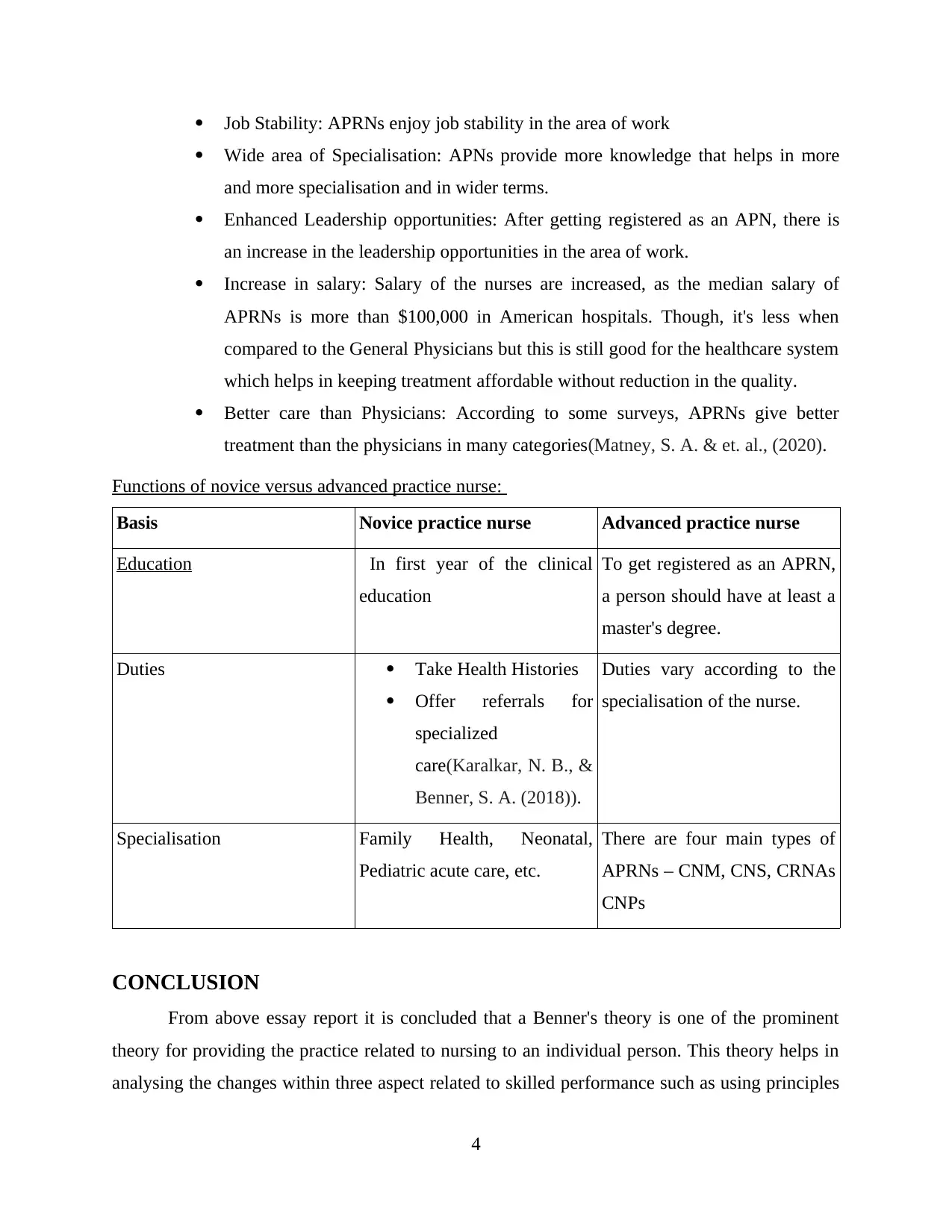
Job Stability: APRNs enjoy job stability in the area of work
Wide area of Specialisation: APNs provide more knowledge that helps in more
and more specialisation and in wider terms.
Enhanced Leadership opportunities: After getting registered as an APN, there is
an increase in the leadership opportunities in the area of work.
Increase in salary: Salary of the nurses are increased, as the median salary of
APRNs is more than $100,000 in American hospitals. Though, it's less when
compared to the General Physicians but this is still good for the healthcare system
which helps in keeping treatment affordable without reduction in the quality.
Better care than Physicians: According to some surveys, APRNs give better
treatment than the physicians in many categories(Matney, S. A. & et. al., (2020).
Functions of novice versus advanced practice nurse:
Basis Novice practice nurse Advanced practice nurse
Education In first year of the clinical
education
To get registered as an APRN,
a person should have at least a
master's degree.
Duties Take Health Histories
Offer referrals for
specialized
care(Karalkar, N. B., &
Benner, S. A. (2018)).
Duties vary according to the
specialisation of the nurse.
Specialisation Family Health, Neonatal,
Pediatric acute care, etc.
There are four main types of
APRNs – CNM, CNS, CRNAs
CNPs
CONCLUSION
From above essay report it is concluded that a Benner's theory is one of the prominent
theory for providing the practice related to nursing to an individual person. This theory helps in
analysing the changes within three aspect related to skilled performance such as using principles
4
Wide area of Specialisation: APNs provide more knowledge that helps in more
and more specialisation and in wider terms.
Enhanced Leadership opportunities: After getting registered as an APN, there is
an increase in the leadership opportunities in the area of work.
Increase in salary: Salary of the nurses are increased, as the median salary of
APRNs is more than $100,000 in American hospitals. Though, it's less when
compared to the General Physicians but this is still good for the healthcare system
which helps in keeping treatment affordable without reduction in the quality.
Better care than Physicians: According to some surveys, APRNs give better
treatment than the physicians in many categories(Matney, S. A. & et. al., (2020).
Functions of novice versus advanced practice nurse:
Basis Novice practice nurse Advanced practice nurse
Education In first year of the clinical
education
To get registered as an APRN,
a person should have at least a
master's degree.
Duties Take Health Histories
Offer referrals for
specialized
care(Karalkar, N. B., &
Benner, S. A. (2018)).
Duties vary according to the
specialisation of the nurse.
Specialisation Family Health, Neonatal,
Pediatric acute care, etc.
There are four main types of
APRNs – CNM, CNS, CRNAs
CNPs
CONCLUSION
From above essay report it is concluded that a Benner's theory is one of the prominent
theory for providing the practice related to nursing to an individual person. This theory helps in
analysing the changes within three aspect related to skilled performance such as using principles
4
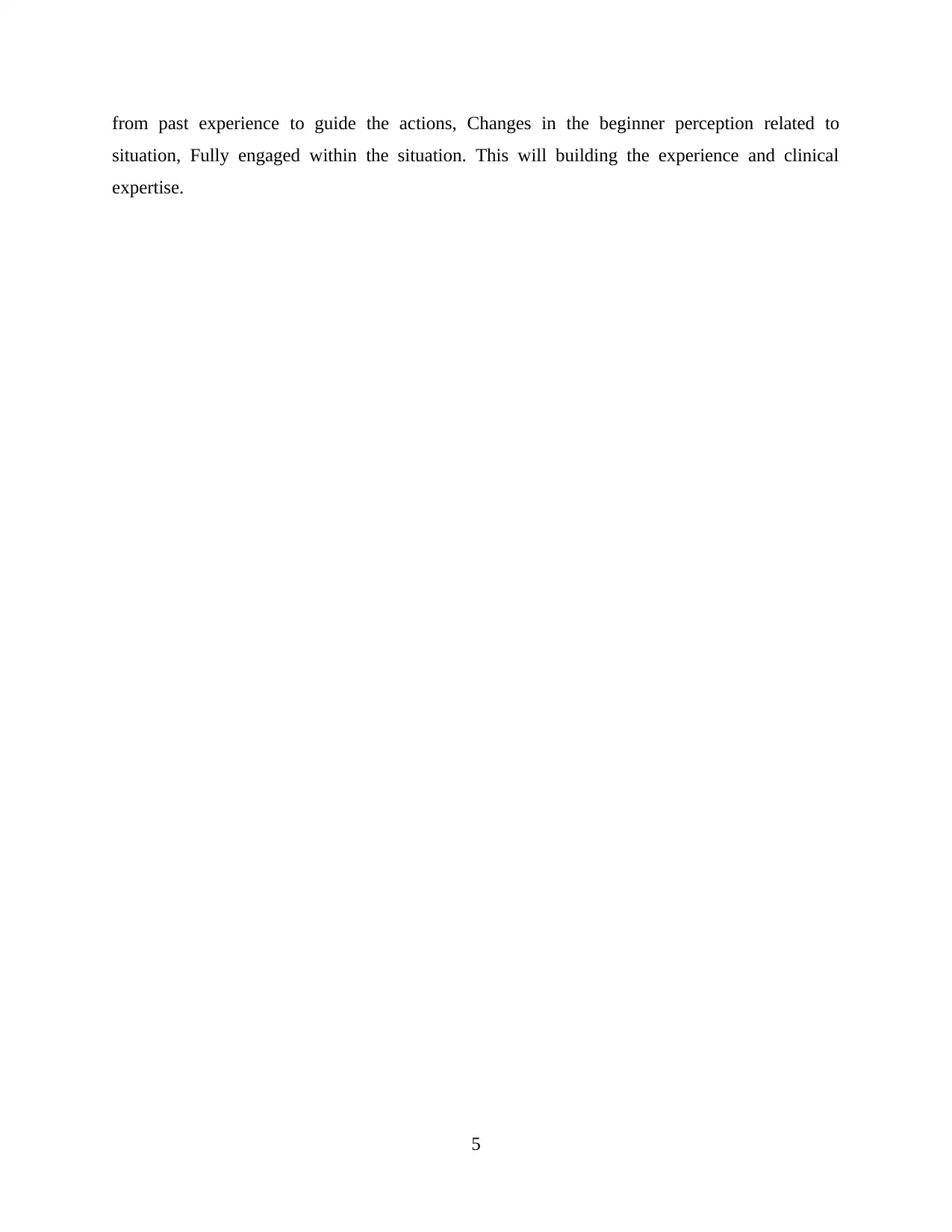
from past experience to guide the actions, Changes in the beginner perception related to
situation, Fully engaged within the situation. This will building the experience and clinical
expertise.
5
situation, Fully engaged within the situation. This will building the experience and clinical
expertise.
5
Paraphrase This Document
Need a fresh take? Get an instant paraphrase of this document with our AI Paraphraser
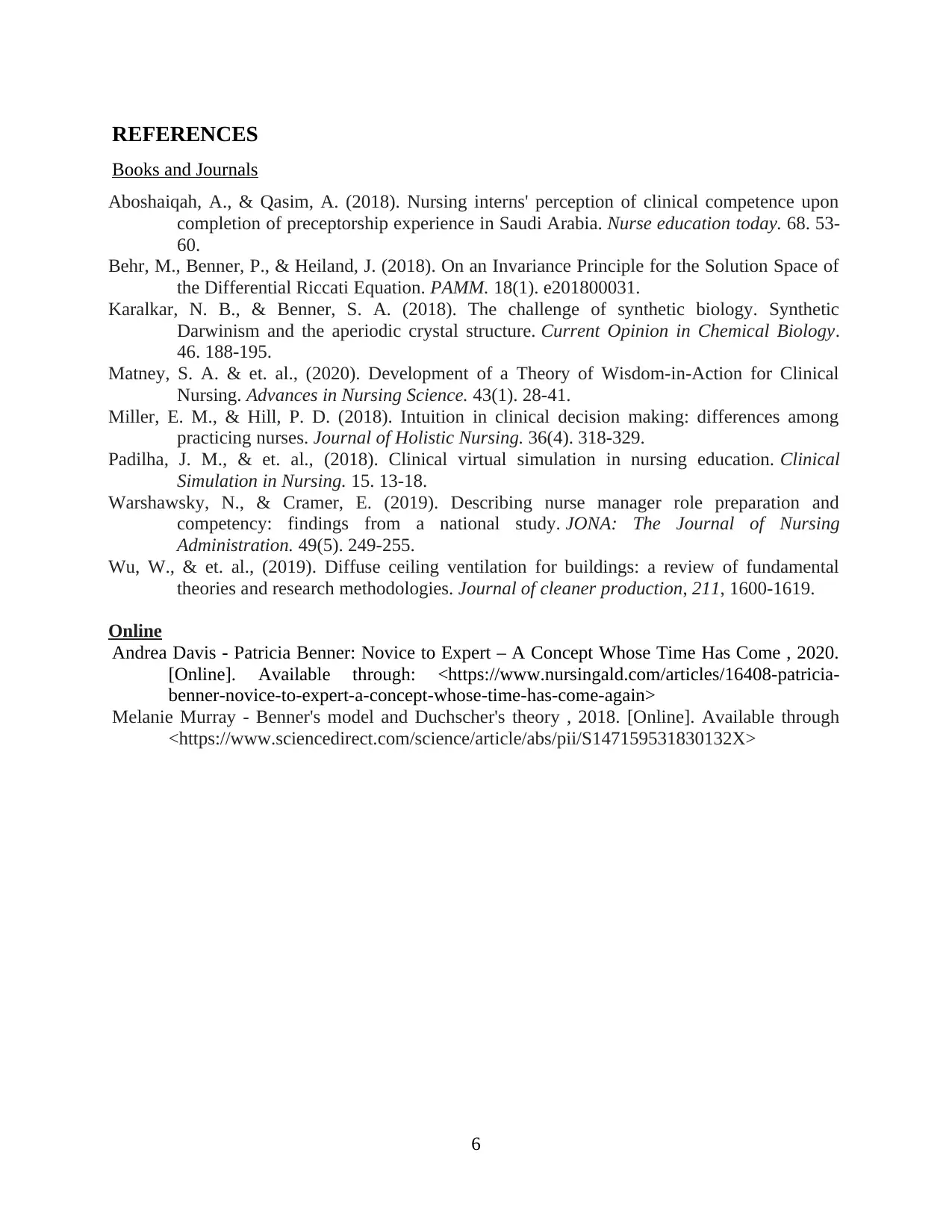
REFERENCES
Books and Journals
Aboshaiqah, A., & Qasim, A. (2018). Nursing interns' perception of clinical competence upon
completion of preceptorship experience in Saudi Arabia. Nurse education today. 68. 53-
60.
Behr, M., Benner, P., & Heiland, J. (2018). On an Invariance Principle for the Solution Space of
the Differential Riccati Equation. PAMM. 18(1). e201800031.
Karalkar, N. B., & Benner, S. A. (2018). The challenge of synthetic biology. Synthetic
Darwinism and the aperiodic crystal structure. Current Opinion in Chemical Biology.
46. 188-195.
Matney, S. A. & et. al., (2020). Development of a Theory of Wisdom-in-Action for Clinical
Nursing. Advances in Nursing Science. 43(1). 28-41.
Miller, E. M., & Hill, P. D. (2018). Intuition in clinical decision making: differences among
practicing nurses. Journal of Holistic Nursing. 36(4). 318-329.
Padilha, J. M., & et. al., (2018). Clinical virtual simulation in nursing education. Clinical
Simulation in Nursing. 15. 13-18.
Warshawsky, N., & Cramer, E. (2019). Describing nurse manager role preparation and
competency: findings from a national study. JONA: The Journal of Nursing
Administration. 49(5). 249-255.
Wu, W., & et. al., (2019). Diffuse ceiling ventilation for buildings: a review of fundamental
theories and research methodologies. Journal of cleaner production, 211, 1600-1619.
Online
Andrea Davis - Patricia Benner: Novice to Expert – A Concept Whose Time Has Come , 2020.
[Online]. Available through: <https://www.nursingald.com/articles/16408-patricia-
benner-novice-to-expert-a-concept-whose-time-has-come-again>
Melanie Murray - Benner's model and Duchscher's theory , 2018. [Online]. Available through
<https://www.sciencedirect.com/science/article/abs/pii/S147159531830132X>
6
Books and Journals
Aboshaiqah, A., & Qasim, A. (2018). Nursing interns' perception of clinical competence upon
completion of preceptorship experience in Saudi Arabia. Nurse education today. 68. 53-
60.
Behr, M., Benner, P., & Heiland, J. (2018). On an Invariance Principle for the Solution Space of
the Differential Riccati Equation. PAMM. 18(1). e201800031.
Karalkar, N. B., & Benner, S. A. (2018). The challenge of synthetic biology. Synthetic
Darwinism and the aperiodic crystal structure. Current Opinion in Chemical Biology.
46. 188-195.
Matney, S. A. & et. al., (2020). Development of a Theory of Wisdom-in-Action for Clinical
Nursing. Advances in Nursing Science. 43(1). 28-41.
Miller, E. M., & Hill, P. D. (2018). Intuition in clinical decision making: differences among
practicing nurses. Journal of Holistic Nursing. 36(4). 318-329.
Padilha, J. M., & et. al., (2018). Clinical virtual simulation in nursing education. Clinical
Simulation in Nursing. 15. 13-18.
Warshawsky, N., & Cramer, E. (2019). Describing nurse manager role preparation and
competency: findings from a national study. JONA: The Journal of Nursing
Administration. 49(5). 249-255.
Wu, W., & et. al., (2019). Diffuse ceiling ventilation for buildings: a review of fundamental
theories and research methodologies. Journal of cleaner production, 211, 1600-1619.
Online
Andrea Davis - Patricia Benner: Novice to Expert – A Concept Whose Time Has Come , 2020.
[Online]. Available through: <https://www.nursingald.com/articles/16408-patricia-
benner-novice-to-expert-a-concept-whose-time-has-come-again>
Melanie Murray - Benner's model and Duchscher's theory , 2018. [Online]. Available through
<https://www.sciencedirect.com/science/article/abs/pii/S147159531830132X>
6
1 out of 8
Related Documents
Your All-in-One AI-Powered Toolkit for Academic Success.
+13062052269
info@desklib.com
Available 24*7 on WhatsApp / Email
![[object Object]](/_next/static/media/star-bottom.7253800d.svg)
Unlock your academic potential
© 2024 | Zucol Services PVT LTD | All rights reserved.





